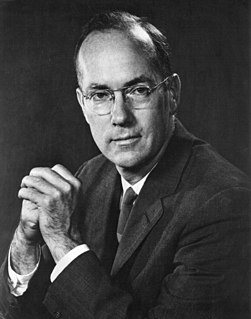A Quote by Roger Penrose
I would say the universe has a purpose. It's not there just somehow by chance.
Related Quotes
There is a certain sense in which I would say the universe has a purpose. It's not there just somehow by chance. Some people take the view that the universe is simply there and it runs along-it's a bit as though it just sort of computes, and we happen by accident to find ourselves in this thing. I don't think that's a very fruitful or helpful way of looking at the universe, I think that there is something much deeper about it, about its existence, which we have very little inkling of at the moment.
Science, with its experiments and logic, tries to understand the order or structure of the universe. Religion, with its theological inspiration and reflection, tries to understand the purpose or meaning of the universe. These two are cross-related. Purpose implies structure, and structure ought somehow to be interpretable in terms of purpose.
To assert that the universe has a purpose implies the universe has intent. And intent implies a desired outcome. But who would do the desiring? And what would a desired outcome be? That carbon-based life is inevitable? Or that sentient primates are life's neurological pinnacle? Are answers to these questions even possible without expressing a profound bias of human sentiment? Of course humans were not around to ask these questions for 99.9999% of cosmic history. So if the purpose of the universe was to create humans then the cosmos was embarrassingly inefficient about it.
In a universe governed by God there are no chance events. Indeed, there is no such thing as chance. Chance does not exist. It is merely a word we use to describe mathematical possibilities. But chance itself has no power because it has no being. Chance is not an entity that can influence reality. Chance is not a thing. It is nothing.
The world of science lives fairly comfortably with paradox. We know that light is a wave, and also that light is a particle. The discoveries made in the infinitely small world of particle physics indicate randomness and chance, and I do not find it any more difficult to live with the paradox of a universe of randomness and chance and a universe of pattern and purpose than I do with light as a wave and light as a particle. Living with contradiction is nothing new to the human being.
If the universe were just electrons and selfish genes, meaningless tragedies ... are exactly what we should expect, along with equally meaningless good fortune. Such a universe would be neither evil nor good in intention ... The universe we observe has precisely the properties we should expect if there is, at bottom, no design, no purpose, no evil and no good, nothing but blind pitiless indifference.
Jean-Luc didn't like me to say any bad words in real life, and I would always do it on purpose, just for fun. And he would go crazy! Then he had Brigitte Bardot do just that in 'Contempt.' And in that film she also has this line - 'I want red velvet curtains, or nothing at all in the apartment' - which was something I would always say.
I once thought that if I could ask God one question, I would ask how the universe began, because once I knew that, all the rest is simply equations. But as I got older I became less concerned with how the universe began. Rather, I would want to know why he started the universe. For once I knew that answer, then I would know the purpose of my own life.
Someone once said that if you sat a million monkeys at a million typewriters for a million years, one of them would eventually type out all of Hamlet by chance. But when we find the text of Hamlet, we don't wonder whether it came from chance and monkeys. Why then does the atheist use that incredibly improbable explanation for the universe? Clearly, because it is his only chance of remaining an atheist. At this point we need a psychological explanation of the atheist rather than a logical explanation of the universe.

































